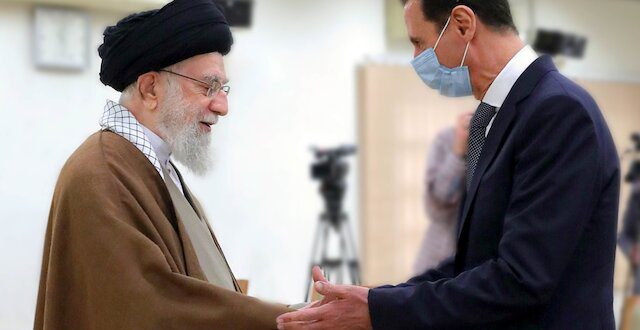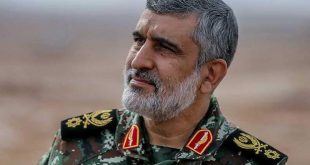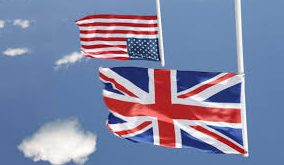Syrian President Bashar Assad met Leader of the Islamic Revolution Ayatollah Seyyed Ali Khamenei and President Ebrahim Raisi here on Sunday, marking his second trip to major wartime ally Iran since a war on Syria erupted in 2011.
They praised the strong ties between their nations and vowed to boost relations further. Assad left Tehran for Damascus later on Sunday.
“Everybody now looks at Syria as a power,” Ayatollah Khamenei told Assad in the meeting, adding the Syrian president and its nation are now honored by all the regional countries.
“Today’s Syria is not what it was before the war, although there were no destructions then, but the respect and prestige of Syria is greater than before, and everyone sees this country as a power,” the Leader added.
Ayatollah Khamenei also hit out at Arab nations that normalized relations with the occupying regime of Israel under the U.S.-sponsored Abraham Accords.
“While leaders of neighboring countries hang out with those of the Zionist regime and drink coffee with them, the people of these countries take to the streets and chant anti-Zionist slogans on Quds Day,” the Leader said.
The United Arab Emirates, Bahrain and Morocco all normalized ties with the Zionist regime in 2020, breaking with decades of Arab consensus that there should be no recognition of Israel in the absence of a peace agreement establishing a Palestinian state.
Ayatollah Khamenei said various factors were influential in Syria’s resistance and victory in an international war.
“One of the most important of those factors was your own high morale and, God willing, you would be able to reconstruct the ravages of war with the same morale, because you have a great work to do.”
The Leader also remembered Lieutenant General Qassem Soleimani, saying, “That honorable martyr harbored a special zeal for Syria and made sacrifices in the true sense of the word. His conduct in Syria was no different from his conduct during the eight-year Sacred Defense in Iran.”
Ayatollah Khamenei said the high morale and vibrancy of the Syrian president could facilitate great works.
“The president and administration of the Islamic Republic of Iran are also really vibrant and have very high moral and strong determination and they are very serious about the issue of Syria. This opportunity must be used to promote bilateral relations more than any time before.”

Everybody Now Looks at Syria as a Power
Assad, for his part, said that strong relations between Iran and Syria served as a bulwark against the occupying regime of Israel’s influence in the Middle East.
“The strategic ties between Iran and Syria have prevented the Zionist regime’s dominance in the region” he said.
“The steadfastness of Iran and its unwavering stances in the past four decades on regional issues, especially on the issue of Palestine, have shown to the entire world that Iran’s path is a correct and principled path,” he added.
Assad said the ravages of war could be reconstructed, but if principles are lost, they cannot be reconstructed.
“The steadfastness of the Iranian nation on the principles and fundaments laid by Imam Khomeini, which has continued through your determination, has paved the way for great triumphs of the great nation of Iran and the regional people, especially the people of Palestine.”
President Raisi said in meeting with Assad that his government’s priority is to strengthen strategic ties with Syria.
Raisi said the future course of developments in the West Asia region, especially with regard to Palestine, will be determined by resistance of nations, not negotiating tables.
“What determines the future of the region and Palestine are not negotiation tables and such agreements as the Oslo Accords, and Camp David and the Deal of the Century, but it is the resistance of nations that determines the new regional order,” he said.
“What we are witnessing today across West Asia is the fulfillment of a prediction by Leader of the Islamic Revolution [Ayatollah Seyyed Ali Khamenei] that resistance of nations against the oppressors and aggressors will bear fruit.”
Raisi then laid stress on the need for all countries to respect Syria’s national sovereignty and territorial integrity.
“Iran stood by the Syrian people and government when some Arab and non-Arab leaders in the region were betting on the time of the fall of the Syrian government.”
He said the battle fought by Syria’s army and allied popular forces, along with the Islamic resistance combatants, especially the heroic Hezbollah, played a leading role in uprooting the military power of the Daesh terrorist group and other terrorist groups, which posed a threat to security of the entire region.
The Iranian president expressed regret that important parts of the Syrian territory are still occupied by the foreign forces, adding the entire Syria must be liberated from foreign occupiers.
“This occupation should not be subject to the passage of time, and the occupying forces and their mercenaries must be expelled,” Raisi pointed out.
He said the Zionist regime’s threats in the region should be addressed by strengthening and diversifying deterrence equations.
Assad, for his part, declared his country’s readiness to expand cooperation with Iran in political, security and economic fields.
Syria’s president also highlighted Iran’s role in fighting terrorism across the region, saying, “During years of resistance against and confrontation with the Western and takfiri aggression, Iran was the only country that stood by us from the very beginning.”
Assad described Iran’s relations with Syria as strategic, noting that after a decade of war against the resistance front, regional developments have proven that resistance is effective and fruitful.
The U.S., he said, is losing its role in the region. “We have proven that through close cooperation among regional countries, it is possible to triumph over the United States and other hegemonic powers that claim to be superpowers.”
Economic ties between Iran and Syria have grown in recent years, with the Islamic Republic supplying the Arab country with credit lines.
Assad has rarely traveled abroad since the 2011 war. He has visited key allies Russia and Iran, and made his first trip to the United Arab Emirates since the conflict earlier this year — the clearest signal yet that the Arab world is willing to re-engage with Syria’s president.
The Tehran visit on Sunday marked Assad’s first trip to the Iranian capital in over two years. The visit was not announced beforehand.
 صراط عشق صراط عشق
صراط عشق صراط عشق



